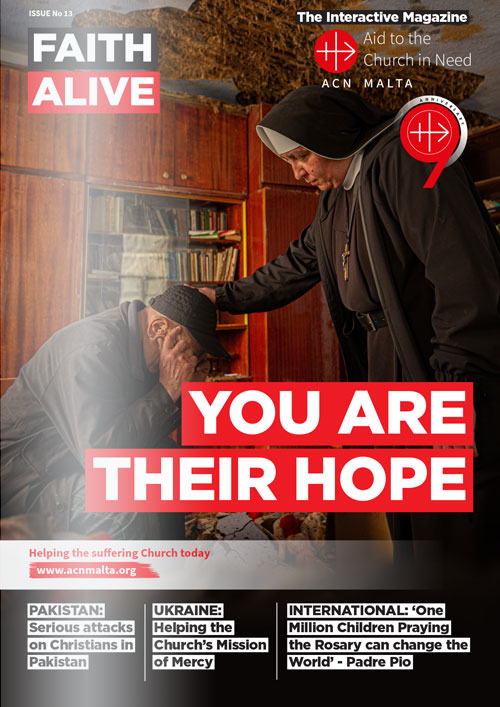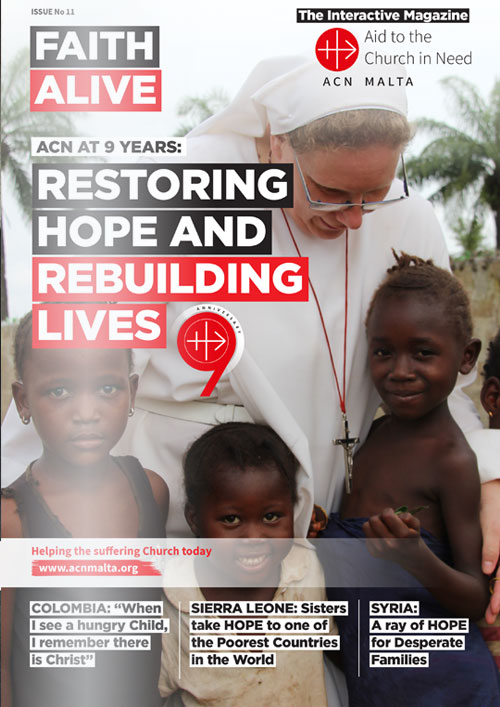Religious Freedom Report 2023: Persecutions worsens, impunity increases
- Religious persecution has increased – in 47 of the most dangerous countries the situation has worsened
- Acceleration and concentration of threats to the faithful in all regions of the world
- Impunity is on the rise – in 36 countries attackers are rarely or never prosecuted
Aid to the Church in Need (ACN) has released the latest edition of its Religious Freedom in the World Report (RFR), which reveals that persecution has increased since January 2021, while impunity continues to be the rule when it comes to attackers, including oppressive governments.
The RFR has been published by international Catholic foundation ACN every two years since 1999 and is the only non-Governmental report on global religious freedom that covers all faiths.
The fundamental human right to freedom of thought, conscience and religion is violated in one out of every three countries (31%), which is to say in 61 out of 196 nations. In total, almost 4.9 billion people, or 62% of the world’s population, live in countries where religious freedom is heavily restricted.
The 2023 Religious Freedom in the World Report (RFR), published on 22 June by the pontifical foundation Aid to the Church in Need (ACN), underlines the accelerating threats and trends against this right, revealing that persecution on grounds of faith has worsened overall, and impunity has increased.
The study covers the period between January 2021 and December 2022, and is the only non-governmental report that analyses compliance and violations worldwide, for all religions, of the right as laid out in Article 18 of the Universal Declaration of Human Rights.
The report finds that discrimination and persecution are clearly noticeable in 61 countries, and that in 49 of these it is the government that persecutes or even murders its own citizens on religious grounds with scarcely a reaction from the international community. Even majority religious communities are now under threat.

Victor, a 45-year-old Ukrainian, discovers an image of Our Lady in the wreckage of a destroyed building at the Holy Family centre in Zarychany (Ukraine)
Religious persecution has worsened
According to the RFR map, 28 states are marked in red as “hot countries” (indicating persecution), denoting the most dangerous places in the world for practicing religion freely, and 33 are orange indicating high levels of discrimination. In 47 of these countries the situation has worsened since the last report was published, whereas things only improved, in terms of religious freedom, in nine of them.
One of the main conclusions of ACN’s report is that minority religious communities are in an increasingly dire situation, and in some cases face the threat of extinction due to a combination of terrorism, attacks on their cultural heritage, and more subtle measures such as the proliferation of anti-conversion laws, manipulation of electoral rules and financial restrictions. However, there are also cases of majority religious communities being persecuted, such as in Nicaragua and Nigeria.
Impunity is on the rise
Over the past two years, the report also notes the global increase of the power and scope of authoritarian governments and fundamentalist leaders who seek to exercise limitless power and are both jealous and fearful of the spiritual authority and mobilisation capacity of religious communities. This has a deadly effect on religious freedom. Impunity has become a constant around the world, and in 36 countries (18%) attackers are rarely, if ever, prosecuted for their crimes.
The silence on the part of the international community contributes to this culture of impunity for regimes considered to be strategically important for the West, such as China and India, which end up not being subjected to international sanctions or any other consequences for their violations of religious freedom. The same applies to countries such as Nigeria and Pakistan.
One such example of these oppressive regimes, according to the RFR, is Nicaragua, which for the first time was included on the list of countries with the highest levels of religious freedom violations.

Fr Pier Luigi Maccalli shows remains from his time as a hostage: a cross, a rosary and a part of a chain. He was kidnapped for two years by Islamist terrorists in Sub-Saharan Africa
Main findings
Africa continues to be the most violent continent, with an increase in jihadist attacks making the religious freedom situation even more alarming. Almost half of the “hot countries” in the RFR map, that is 13 out of 28, are in Africa. The concentration of jihadist activity is especially evident in the Sahel region, around Lake Chad, Mozambique, and Somalia, and is spreading to neighbouring countries, many of which remain under observation, having suffered Islamist attacks on their borders.
China and North Korea remain the two countries in Asia with the worst record of human rights violations including religious freedom, with the state exercising totalitarian control through surveillance and extreme measures of repression against the population.
The RFR also pays close attention to India, where persecution levels have been on the rise, with the imposition of a dangerous ethno-religious nationalism that is harmful to religious minorities. Anti-conversion laws have been approved, or are under consideration, in 12 of India’s 28 states, carrying penalties of up to 10 years in prison. Furthermore, these laws include financial benefits for those who convert, or revert, to the majority religion.
Incidents of forced religious conversion, abductions and sexual violence (including sexual slavery) have not decreased during the two-year period under review, and in fact remain largely ignored by local law-enforcement, as is the case in Pakistan where young Christian and Hindu girls are often abducted and subjected to forced marriages. Besides the gross violation of their human rights including religious freedom, these practices also have the effect of limiting the growth of their religious communities.
The RFR also highlights the serious internal crises that are occurring in Muslim communities all over the world. On one hand, many young Muslims continue to be attracted to Islamist terrorist networks, but on the other, especially in the Middle East, there are signs of a widespread secularisation. In Iran, for example, there are surveys indicating that 47% of the population claimed no religious affiliation and only 32% identified as Shiite during the recent Iranian women’s “hijab revolution”.

ACN Night of the Witnesses in honour of Christians murdered for their Faith, held at St Christopher’s Catholic Cathedral in Canberra, Australia, on 23.11.2022
Cancel culture
The RFR draws attention to concerns over increasing limits to freedom of thought, conscience, and religion in countries that belong to the Organization for Security and Cooperation in Europe (OSCE). Over the past two years the West has shifted from a climate of “polite persecution” towards those who want to openly live and express their faith to one of a “cancel culture” and “enforced speech” with strong social pressure to conform to current ideological trends.
On a positive note, the report points out an increase in interreligious dialogue initiatives, and the joyful return to unrestricted religious celebrations in many countries after COVID 19 lockdowns.
Regina Lynch, recently appointed as executive president of ACN International, explains that the main purpose of this report is to “motivate people to get involved and help those suffering from religious persecution through prayer, sharing information, speaking up for victims, engaging politicians and keeping informed about reality on the ground in different parts of the world”.
“The ACN Religious Freedom in the World Report seeks only to collate information and provide analysis about the abuse of this fundamental human right worldwide. It is a tool. The tool is only as good as those who take it up, share it with others, and work to effect change”, says Regina Lynch.
Please “Help us support those in Need”

Registered before? Log in to use your saved details.
If you registered an account, please enter your details below to login. If this is your first time, proceed to the donation form.














